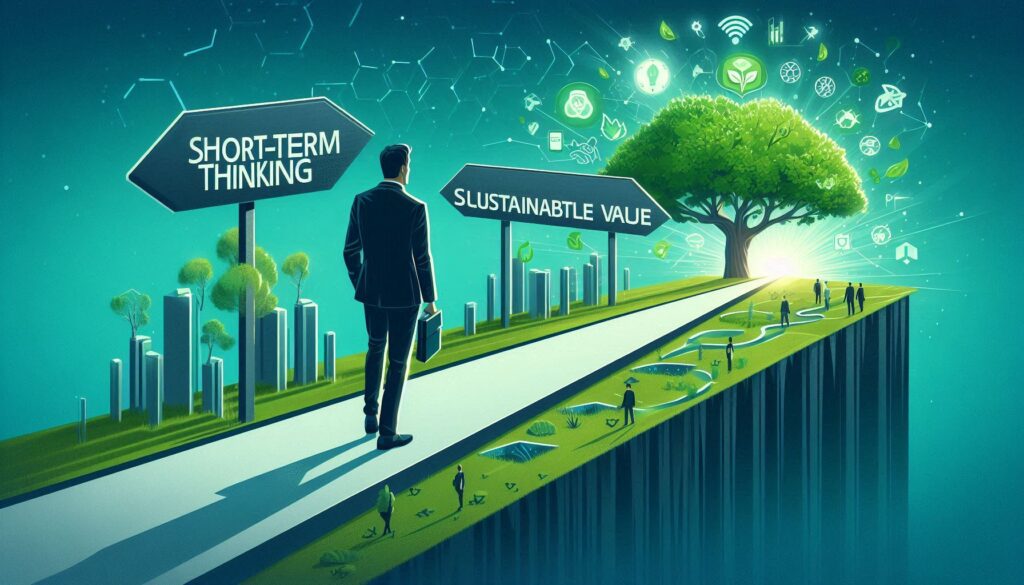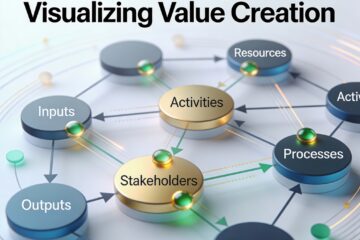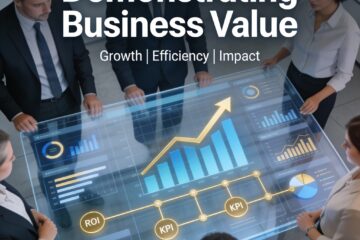In today’s rapidly evolving marketplace, we find ourselves increasingly aware of the significance of sustainable business value. This concept transcends mere profitability; it encompasses the long-term viability of our enterprises while considering the environmental and social impacts of our operations. As we navigate through a world grappling with climate change, resource depletion, and social inequality, we recognize that businesses must adapt to these challenges.
Sustainable business value is not just a trend; it is a necessity for survival and growth in the modern economy. By embracing sustainable practices, we can create a positive impact on society and the environment while simultaneously enhancing our bottom line. This dual focus allows us to build resilience against market fluctuations and regulatory changes.
As we align our business strategies with sustainable principles, we not only contribute to a healthier planet but also position ourselves as leaders in our respective industries. The importance of sustainable business value lies in its ability to foster innovation, attract talent, and build customer loyalty, all of which are essential for long-term success.
Key Takeaways
- Sustainable business value is important for long-term success and resilience.
- Shifting from short-term to long-term thinking is crucial for sustainable business value.
- Embracing a triple bottom line approach considers social, environmental, and financial impacts.
- Fostering a culture of innovation and adaptability is essential for sustainable business value.
- Prioritizing stakeholder engagement and collaboration is key for sustainable business value.
Shifting from Short-term to Long-term Thinking
Rethinking Performance Metrics
By focusing on long-term sustainability, we can make decisions that benefit not only our current stakeholders but also future generations.
This shift requires us to rethink our performance metrics and redefine success.
Instead of solely measuring financial returns, we should also consider the social and environmental impacts of our actions.
Investing in Sustainability
By adopting a long-term perspective, we can invest in initiatives that may not yield immediate financial returns but will ultimately enhance our brand reputation and stakeholder trust.
This approach encourages us to innovate and explore new business models that prioritize sustainability, ensuring that we remain competitive in an ever-changing landscape.
A Sustainable Future
By making this shift, we can create a sustainable future that benefits both our businesses and the environment. It’s time to rethink our priorities and make a commitment to long-term thinking, ensuring a prosperous future for generations to come.
Embracing a Triple Bottom Line Approach

As we delve deeper into sustainable business practices, we find the triple bottom line (TBL) approach to be particularly enlightening. This framework emphasizes the importance of balancing economic, social, and environmental considerations in our decision-making processes. By adopting TBL, we can evaluate our performance through a more holistic lens, recognizing that our success is intertwined with the well-being of people and the planet.
Incorporating TBL into our business strategy encourages us to seek out opportunities that create shared value. For instance, by investing in community development or reducing our carbon footprint, we not only enhance our corporate image but also contribute positively to society. This interconnectedness fosters a sense of responsibility among our employees and stakeholders, motivating us to work collaboratively towards common goals.
Ultimately, embracing a triple bottom line approach allows us to create a more sustainable future while driving profitability.
Fostering a Culture of Innovation and Adaptability
Innovation is at the heart of sustainable business value, and fostering a culture that encourages creativity and adaptability is essential for our success. In an era marked by rapid technological advancements and shifting consumer preferences, we must be willing to embrace change and explore new ideas. By cultivating an environment where experimentation is encouraged, we empower our teams to think outside the box and develop innovative solutions to complex challenges.
Adaptability is equally crucial as we navigate the uncertainties of the modern business landscape. We recognize that the ability to pivot in response to emerging trends or disruptions can set us apart from our competitors. By fostering a culture of continuous learning and improvement, we position ourselves to respond effectively to changing market dynamics while remaining committed to our sustainability goals.
This proactive approach not only enhances our resilience but also drives long-term growth and success.
Prioritizing Stakeholder Engagement and Collaboration
In our pursuit of sustainable business value, we must prioritize stakeholder engagement and collaboration. Our stakeholders—including employees, customers, suppliers, and local communities—play a vital role in shaping our sustainability initiatives. By actively involving them in our decision-making processes, we can gain valuable insights and foster a sense of ownership among those affected by our actions.
Collaboration extends beyond our immediate stakeholders; it also involves forming partnerships with other organizations, NGOs, and government entities. By working together towards common sustainability goals, we can leverage each other’s strengths and resources to drive meaningful change. This collaborative approach not only enhances our credibility but also amplifies our impact on social and environmental issues.
Ultimately, prioritizing stakeholder engagement allows us to build stronger relationships and create shared value for all parties involved.
Investing in Sustainable Practices and Technologies

Investing in sustainable practices and technologies is paramount as we strive to enhance our business value while minimizing our environmental footprint. We recognize that integrating sustainability into our operations requires upfront investment; however, the long-term benefits far outweigh the initial costs. By adopting energy-efficient technologies, reducing waste, and sourcing sustainable materials, we can significantly lower our operational costs while contributing to a healthier planet.
Moreover, investing in research and development allows us to explore innovative solutions that align with our sustainability goals. Whether it’s developing eco-friendly products or implementing circular economy principles, these investments position us as industry leaders committed to driving positive change. As we embrace sustainable practices, we not only enhance our reputation but also attract environmentally conscious consumers who are increasingly seeking out brands that align with their values.
Measuring and Reporting on Environmental, Social, and Governance (ESG) Metrics
To effectively communicate our commitment to sustainable business value, we must measure and report on environmental, social, and governance (ESG) metrics. These metrics provide us with a framework for assessing our performance in key areas related to sustainability. By establishing clear benchmarks and tracking our progress over time, we can hold ourselves accountable for our commitments while demonstrating transparency to our stakeholders.
Reporting on ESG metrics also enhances our credibility in the eyes of investors and consumers alike. As more individuals seek out socially responsible investments, showcasing our commitment to sustainability can attract new capital and foster customer loyalty. Furthermore, by sharing our successes and challenges openly, we contribute to a broader dialogue about sustainability within our industry.
This transparency not only builds trust but also encourages other organizations to adopt similar practices.
Aligning Business Goals with Sustainable Development Goals (SDGs)
Aligning our business goals with the United Nations Sustainable Development Goals (SDGs) is an essential step towards creating sustainable business value. The SDGs provide a comprehensive framework for addressing global challenges such as poverty, inequality, climate change, and environmental degradation. By integrating these goals into our corporate strategy, we can ensure that our efforts contribute meaningfully to a more sustainable future.
This alignment requires us to identify specific SDGs that resonate with our mission and values. For instance, if we operate in the renewable energy sector, focusing on SDG 7 (Affordable and Clean Energy) may be particularly relevant. By setting measurable targets related to these goals, we can track our progress and demonstrate our commitment to sustainability.
Ultimately, aligning with the SDGs not only enhances our corporate responsibility but also positions us as leaders in driving positive change on a global scale.
Leveraging Sustainable Business Value as a Competitive Advantage
As we continue to integrate sustainability into our core business strategies, we recognize that sustainable business value can serve as a powerful competitive advantage. In an increasingly crowded marketplace, consumers are becoming more discerning about the brands they support. By positioning ourselves as environmentally responsible organizations committed to social equity, we can differentiate ourselves from competitors who may not prioritize sustainability.
Moreover, embracing sustainable practices often leads to operational efficiencies that can enhance profitability. For instance, reducing energy consumption or minimizing waste not only benefits the environment but also lowers costs—allowing us to reinvest those savings into further innovation or community initiatives. By leveraging sustainable business value as a competitive advantage, we can attract new customers while retaining existing ones who share our commitment to sustainability.
Building Trust and Reputation through Sustainable Practices
Building trust and reputation is crucial for any organization seeking long-term success, and sustainable practices play a pivotal role in this endeavor. As consumers become increasingly aware of corporate social responsibility issues, they are more likely to support brands that demonstrate genuine commitment to sustainability. By transparently communicating our efforts and engaging in ethical practices, we can cultivate trust among stakeholders.
Additionally, fostering a culture of sustainability within our organization enhances employee morale and loyalty. When team members see their company actively working towards positive change, they are more likely to feel proud of their association with the brand. This internal alignment not only boosts productivity but also strengthens our overall reputation in the marketplace.
Ultimately, building trust through sustainable practices creates a virtuous cycle that benefits both our organization and society at large.
The Role of Leadership in Driving Sustainable Business Value
Leadership plays an instrumental role in driving sustainable business value within organizations. As leaders, it is essential for us to model sustainable behaviors and articulate a clear vision for integrating sustainability into every aspect of our operations. By championing sustainability initiatives at the highest levels of decision-making, we inspire others within the organization to embrace these values as well.
Moreover, effective leadership involves fostering collaboration across departments and encouraging open dialogue about sustainability challenges and opportunities. By empowering employees at all levels to contribute ideas and solutions related to sustainability, we create an inclusive culture that values diverse perspectives. This collaborative approach not only enhances innovation but also ensures that sustainability becomes ingrained in the fabric of our organizational identity.
In conclusion, as we navigate the complexities of modern business landscapes, understanding the importance of sustainable business value becomes paramount for long-term success. By shifting from short-term thinking to embracing a triple bottom line approach while fostering innovation and collaboration among stakeholders, we position ourselves as leaders committed to creating positive change in society and the environment. Through strategic investments in sustainable practices and technologies while measuring ESG metrics aligned with global goals like the SDGs—our organizations can leverage this commitment as a competitive advantage while building trust among consumers through transparent actions led by visionary leadership dedicated towards driving meaningful impact for future generations.
In a related article on nurturing resilient leadership here, the importance of developing leaders who can adapt to change and drive sustainable business value is highlighted. This article delves into the qualities and skills that resilient leaders possess, emphasizing the need for organizations to invest in leadership development to navigate the complexities of today’s business environment. By fostering resilient leadership, companies can better position themselves to thrive in the face of uncertainty and drive long-term success.
FAQs
What is the mindset shift that drives sustainable business value?
The mindset shift that drives sustainable business value is a shift from short-term thinking to long-term thinking. This involves prioritizing sustainable practices, ethical decision-making, and considering the impact of business decisions on all stakeholders, including employees, customers, and the environment.
Why is this mindset shift important for businesses?
This mindset shift is important for businesses because it allows them to create long-term value and resilience. By considering the long-term impact of their actions, businesses can build trust with stakeholders, reduce risk, and contribute to a more sustainable and equitable future.
How can businesses implement this mindset shift?
Businesses can implement this mindset shift by integrating sustainability into their core business strategy, setting long-term goals that prioritize environmental and social impact, and engaging with stakeholders to understand their needs and concerns. This may also involve re-evaluating traditional metrics of success and considering the triple bottom line of people, planet, and profit.
What are the benefits of adopting this mindset shift?
The benefits of adopting this mindset shift include improved brand reputation, increased employee satisfaction and retention, reduced environmental impact, and enhanced resilience in the face of economic and social challenges. Additionally, businesses may find new opportunities for innovation and growth by aligning with sustainable practices.


